Neighbourhood activities in Riga – an effective way for engaging residents in the local community’s activities
Edited on
13 September 2020The movement of neighbourhood associations is developing more actively in Riga. Residents of neighbourhoods unite to promote good ideas for improving the environment and quality of life in their neighbourhoods, and they are looking for ways of turning neighbourhoods into attractive venues for public events. We invited for a conversation Inese Auziņa, the board member of one of Riga’s neighbourhood associations – “Rada Brasa” [Brasa Creates].
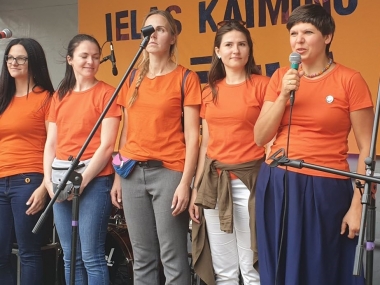
When and how did the idea of establishing an association in Brasa was born?
Initially, the inhabitants of a building in Hospitāļu Street were celebrating the centenary of their house. This developed into a tradition and, over time, they wanted to get to know also other neighbours of the street. The active mothers of the neighbourhood organised Hospitāļu Street Neighbours’ Festival. Fun and entertainment are fine but sometimes serious topics need to be discussed. This requires an association, which unites active people sharing the same aim – improving their neighbourhood.
What kind of activities does the association “Rada Brasa” organise, what does it do?
Basically, these are activities that allow the neighbours to get to know one another as well as projects that improve the neighbourhood’s infrastructure and public outdoor space. The annual Hospitāļu Street Neighbours’ Festival, held on the second Sunday each September, has become an integral part of the Fathers’ Day. We prepare for it several months in advance. We also organise creative workshops in small groups, tournaments of zolīte, a trick-taking card game, knitting evenings. We have started organising a quiz game “Hospitāļu Minds”, which is held every month at the café “Hospitāļu Ezītī miglā”. We communicate with municipality and state institutions regarding topics that pertain to our neighbourhood. For example, we participate in discussions of the city’s development plan. We submitted the project of Brasa sports ground for the competition of participatory budgeting. We collaborate and share experience with other neighbourhoods – we are members of the Association of Riga’s Neighbourhoods.
What about Hospitāļu Street Neighbours’ Festival this year?
This year is no exception - on September 13, 2020 the seventh Hospitāļu Street Neighbours’ Festival took place. We had a friendly atmosphere where families, neighbours and friends enjoyed creative, sporty, creative activities and musical performances! This year, the festival program was enriched by participation of Riga NGO House together with several NGOs, introducing visitors to the mission and activities of NGOs.
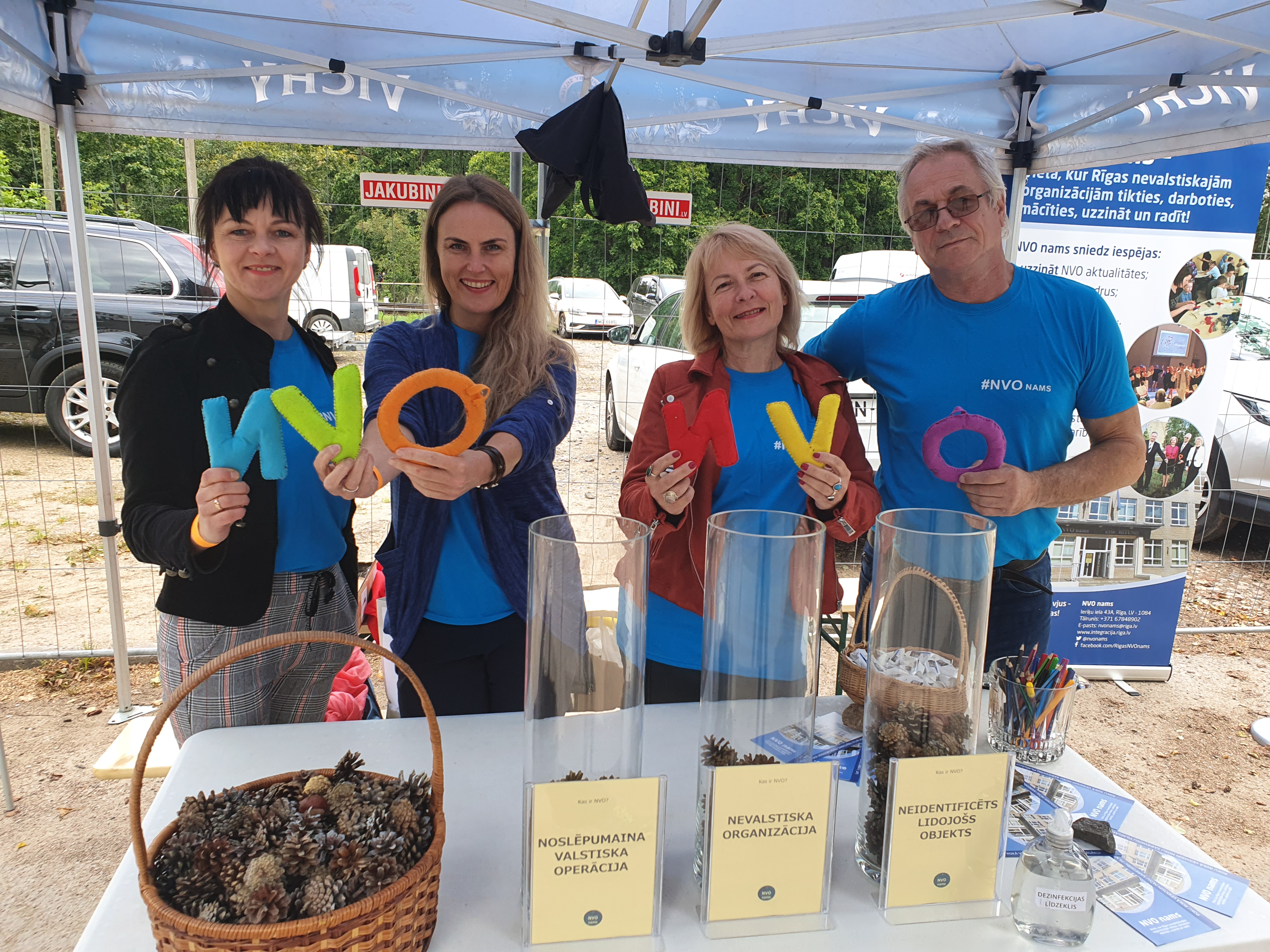
NGO House representatives at the Hospitāļu Street Neighbours’ Festival in 2020
Has the residents’ responsiveness, wish to engage changed?
This wish depends both on each resident’s personal possibilities and the situation in the state, the city and in the neighbourhood in general. The mothers, who were active initially, have returned to their jobs and can no longer dedicate as much time as before to neighbourhood work. However, several young, energetic persons, who have recently moved into newly constructed buildings in Brasa, have joined us, and they care for the future of this neighbourhood. Frequently, when there is a common problem, people unite to fight for a common aim; however, when everything is fine in the neighbourhood people become more passive and simply enjoy life in a nice neighbourhood. Currently, when quarantine has been established throughout the state, people are at home in Riga or have left for the countryside. The movement in the neighbourhood has slowed down but we keep thinking about the future – how to bring joy to the residents now and at the time when we are able to go out again. Those, who have to spend their day working and teaching their kids, have particularly large workload at the moment. Perhaps someone else has more time to think about creative activities to cheer up the neighbours.
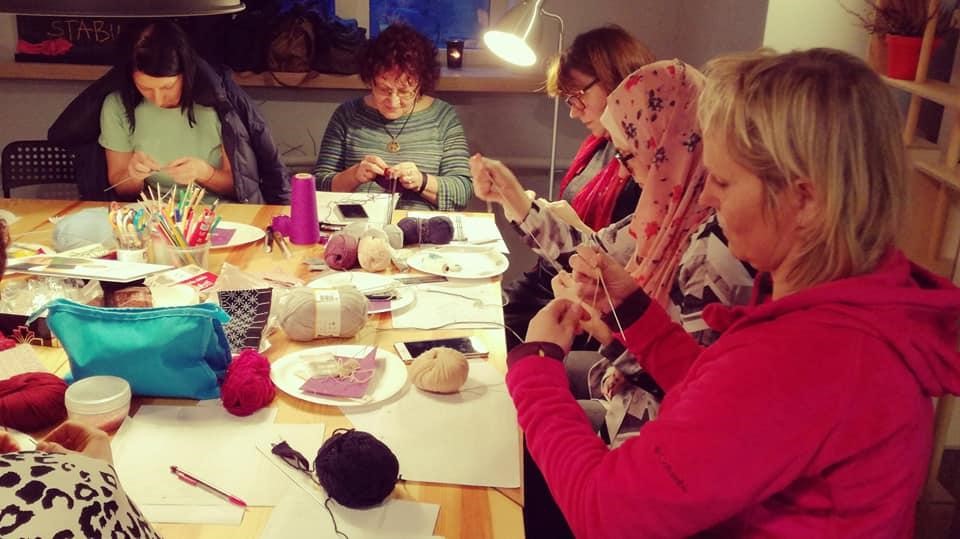
A knitting evening in a nice company
What makes Brasa special among other neighbourhoods? What are you proud of?
Brasa always has been a place of residence favoured by creative personalities – artists, actors, musicians, writers, dancers live here almost in each building. We are lucky – being a densely populated neighbourhood within a small territory, this gives the possibility to become acquainted with our neighbours and address them directly. We are a very friendly neighbourhood. Many families have lived here over several generations. Also my grandfather, one hundred years ago, lived here with his large family with eight offsprings – in Ieroču Street.
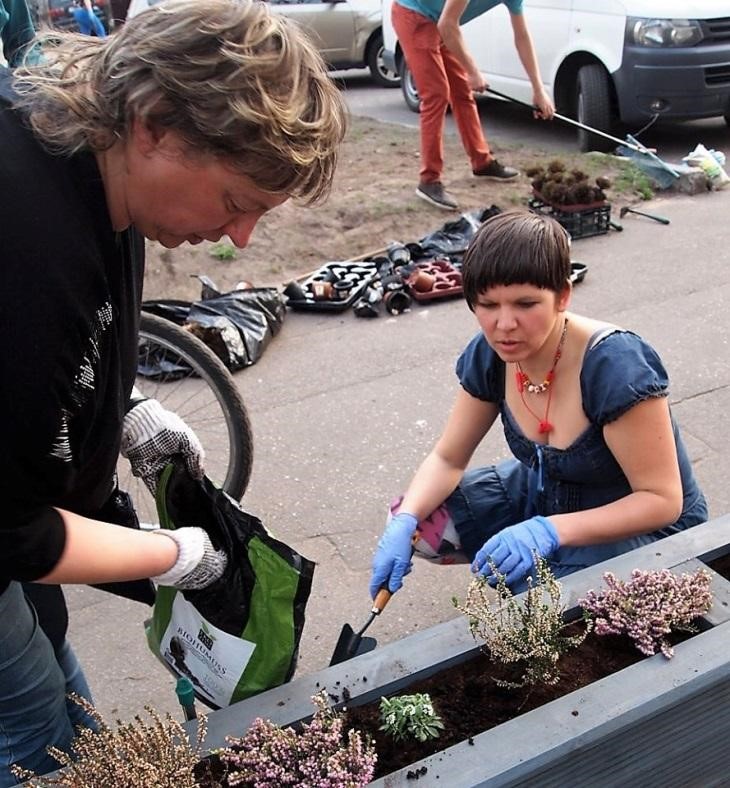
Planting plants in flower boxes, which create a natural fence between linden trees
What events are planned in Brasa in near or more distant future – activities, projects?
First of all, we shall collaborate closely with the Riga City Council in creating Brasa sports ground, which will be built in the framework of participatory budgeting competition. We have met already to discuss and view the specific place, where it will be located. We have seen detailed plans for developing the territory. We have coordinated the colours of the sports ground surface. “We shall keep our hand on the pulse” to ensure that the solution that is built meets the needs of our neighbourhood’s residents.
In the spring of 2019, one of the largest objects of the neighbourhood – the Brasa Prison – was vacated. The Prison Administration, following our proposal, was ready to take those interested on a tour around this complex of buildings. In December, an indoor orienteering competition was held there. These premises have many challenges (heating and, partially, electricity switched off, legal obstacles to entering it, etc.) but we continue developing the cooperation that we have started. Perhaps next year the Brasa Prison will bring us a new surprise.
You responded to the invitation of the NGO House and became involved in URBACT project “The Riga NGO House – Collaboration Platform for Organisations and the Municipality. What are your reflections on this participation?
Usually, when a neighbourhood association is established, premises are the first consideration. In the absence of them, it seems to be a major problem. However, now I see that the availability of premises is a great challenge also in other states of the European Union. For non-governmental organisations, without financing, maintenance of premises of any size is difficult. In the long- term, this cannot be ensured by people’s enthusiasm alone. Smarter solutions need to be found, this could be social entrepreneurship or participation in project competitions, or more direct municipal support for public premises in each neighbourhood. One thing is clear – Riga needs places, where residents can be together.
Have members of the association participated in events at the NGO House? Is this place valuable for supporting NGOs in Riga?
We have often participated in educational seminars organised by the NGO House. For us, the information on planned competitions for financing, which the NGO House collects and disseminates, is particularly important because we cannot follow and know everything by ourselves.
Inese, what does membership in the Association mean for you personally?
Mainly, I am happy that our neighbourhood has become safer. Children know the adults, greet them on the street and are convinced that this is their Home, with the capital “H”. Just 6 years ago it was not like this. Membership in the Association creates a positive sense of support. I am not alone, approximately 13 000 Rigans live in Brasa, and, when gathered, we have Power.
How would you like to see your neighbourhood in 5, 10 or 20 years?
Definitely, the historical architectural values that we have must be safeguarded. Both Art Nouveau and wooden buildings, which is the treasures for the whole of Riga. Once these buildings used to have front gardens and spacious, green yards between the buildings. Now, the yards have been fragmented by fences. These should be merged and restored as a public outdoor space for neighbours.
I would like to see fewer cars and more opportunities for bikers. The greatest challenge is safe storage of bikes because the old buildings have no place for them. Perhaps we should build “stables” for our two-wheeled friends?
And more, as regards major and practical matters, I believe that, in 5–10 years time, you will see street basketball contests at the modern reconstructed Brasa bridge, employees of the Ministry of Justice working in the restored Military Hospital, human rights forum in the Brasa Prison and tours in the well-maintained complex of monuments in the Grand Cemetery.
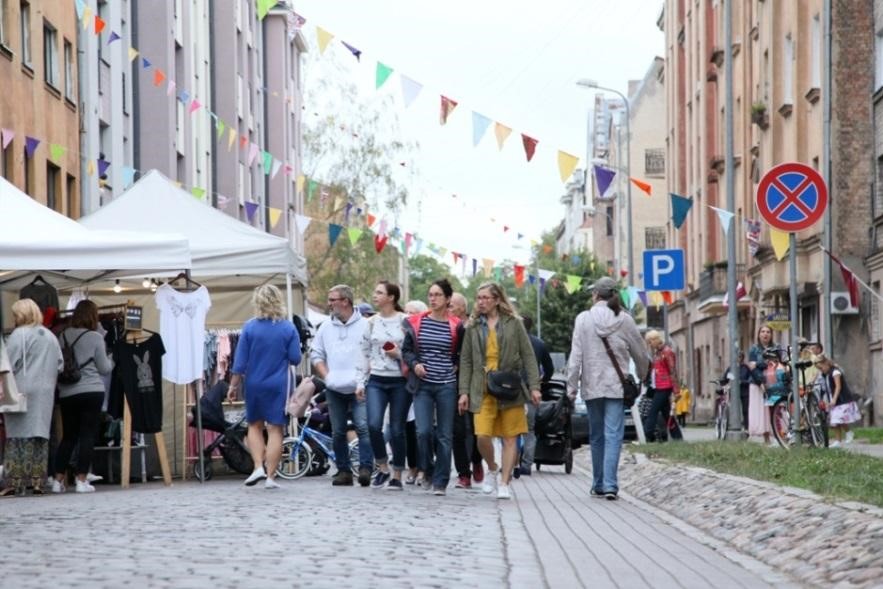
Hospitāļu Street, decorated with banners
In conclusion – what would you wish to other NGOs of Riga and their representatives?
If you are a representative of an NGO then you have already taken the first, most difficult step. My wish to you – persist! When strength and energy seem to be depleted, I suggest going to visit other NGOs to take positive energy from like-minded people. “Compass” events organised by “FreeRiga” inspire for new heroic deeds. Festival “LAMPA” shows the importance of public activism and makes us think about the potential solutions to serious issues. Power can be found wherever you have like-minded people.
Thank you for this conversation.
Interviewed by Zane Gugane, project coordinator of the NGO House
 Submitted by z.biteniece on
Submitted by z.biteniece on
